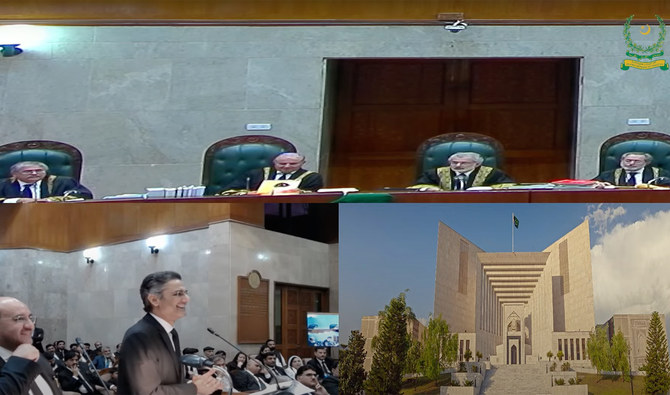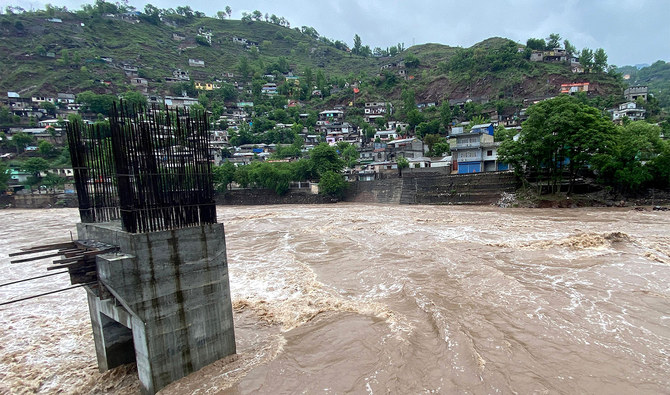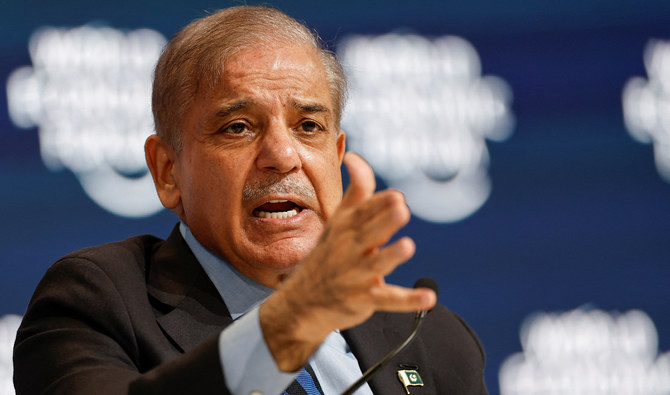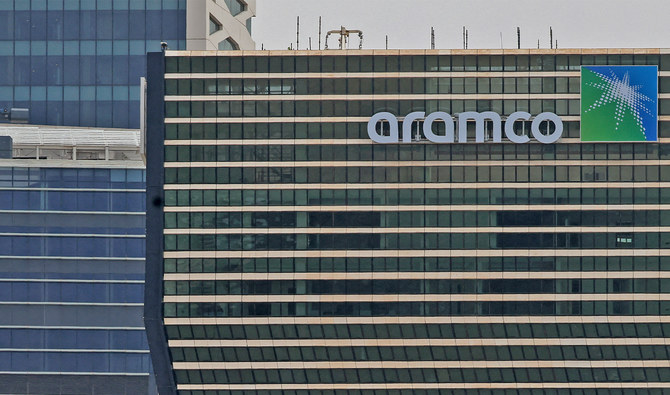KARACHI: Sweeping changes to Pakistan’s cabinet won’t effect annual spending plans or ongoing negotiations with the International Monetary Fund for a bailout package, senior officials said on Friday, a day after Prime Minister Imran Khan announced 10 new ministerial appointments in a shakeup that included the departure of Finance Minister Asad Umar.
On Thursday, Khan appointed Dr. Abdul Hafeez Shaikh, who has served as finance minister from 2010-2013 under the opposition Pakistan Peoples Party when it was in power, as “Adviser on Finance.”
Shaikh, a graduate of Boston University, has taught at Harvard, spent many years working for the World Bank and was privatization minister during the government of former military ruler General Pervez Musharraf.
“There would be no impact on the talks with the IMF due to the changes made by the prime minister,” Yousaf Baig Mirza, Special Assistant to the Prime Minister on Media Affairs, told Arab News on Friday. “The discussions with the IMF have already been done.”
Dr. Abid Qaiyum Suleri, a member of the government’s Economic Advisory Council, agreed that the cabinet reshuffle would not hamper the IMF bailout package.
“I don’t think that dialogue with the IMF would be impacted because the governor of the central bank and the secretary finance usually deal with the IMF and the finance minister meets with the mission head to share the contours of the policy line and the vision of the government,” Suleri said.
Former finance minister Dr. Salman Shah disagreed and said “the new minister would come up with different priorities which would have an impact on both the budget and IMF talks.”
Pakistan is close to signing its 13th IMF bailout program since the late 1980s to stave off a balance of payments crisis. The mission’s team is due in Islamabad by the end of April to finalize the program after spring discussions held in Washington this month. Pakistan is expected to secure a $6-$8 billion deal.
Many believe that Shaikh, who has served at the World Bank in a range of Asian, African and Middle Eastern nations, would be in his element in dealing with the IMF team.
“Hafeez Shaikh has a comfort level with the IMF and the World Bank,” said Khurram Hussain, the business editor of Dawn newspaper. “It now depends on him how quickly he is able to sign a deal with the Fund. Pakistan would have to sign the IMF program before the upcoming budget.”
The cabinet reshuffle has also raised questions of what kind of effect the changes will have on annual spending plans for the financial year ending June 2020, due to be announced in May.
Suleri said the first litmus test for the new finance minister would be the budget he presented: “It would be better if Hafeez Shaikh makes changes to the budget according to his priorities so that he could own and be answerable for it.”
But Nadeem ul Haq, a former head of the Planning Commission, said the shakeup would have little effect on the upcoming budget because it had already been finalized with input from the IMF. “They have been told about the budget by IMF,” he said.
On Thursday at a press conference in which he announced his resignation, Umar had warned against expecting “miracles” from the new finance minister.
“No one should expect from the new finance minister that things will be better in three months,” he said. “The next budget will be a difficult one.”
Haq concurred: “Pakistan’s economic conditions are so deeply complicated the not even a superman or Nobel laureate can solve them. There is no capacity in the existing bureaucratic system.”
“They have tried in the past by bringing in people like Shaukat Aziz,” Haq said, referring to a former finance and prime minister of Pakistan. “Now they are bringing in Hafeez Shaikh; if he will not work someone else will be brought in, the system will keep running like this.”
Suleri warned that the new finance minister had a rough road ahead of him.
“He will have to prepare mechanism for subsidies, strengthen social protection, control inflation, take care of those who are affected by the IMF and other contractionary policies,” Suleri said. “He would be fighting on both fronts, at the macro level for stability and at the micro level to ensure the survival of the people.”
Pakistan cabinet shakeup won't effect IMF bailout, budget preparations – officials
Pakistan cabinet shakeup won't effect IMF bailout, budget preparations – officials

- PM’s special assistant says IMF talks already concluded
- Analysts warn new finance minister faces a tough road ahead
Pakistan’s top court resumes hearing on alleged intelligence interference in judiciary

- The Supreme Court took up the case after six high court judges accused powerful spy agencies of intimidating them
- Chief Justice Qazi Faez Isa says that judgments and court orders ‘shout’ on their own if there has been any meddling
ISLAMABAD: Pakistan’s top court on Tuesday resumed the hearing of a case involving accusations by six high court judges of interference and intimidation by the country’s powerful intelligence agencies in judicial matters.
The Supreme Court of Pakistan took up the case after six out of the eight Islamabad High Court judges accused the military’s Inter-Services Intelligence (ISI) agency of intimidating and coercing them over legal cases, particularly those with significant political consequences.
The judges provided various examples of alleged interference, including a case concerning Pakistan’s imprisoned former prime minister, Imran Khan. They also mentioned incidents where they said their relatives were abducted and tortured, and their homes were secretly surveilled, aiming to coerce them into delivering favorable judgments in specific cases.
Chief Justice of Pakistan (CJP) Qazi Faez Isa, who has repeatedly noted that judicial meddling would not be tolerated, mentioned that such interference could occur in multiple ways.
“Interference can be from within and without, from intelligence agencies, from one’s colleagues and family members or from social media,” he said.
He maintained that judgments and court orders “shout” on their own if there has been interference.
The CJP initially constituted a seven-member bench that last heard the matter on April 3. However, the bench had to be reconstituted after Justice Yahya Afridi recused himself.
Prior to that, the top Supreme Court judge also discussed the matter with Prime Minister Shehbaz Sharif, during which it was decided to form an inquiry commission.
However, a former Pakistan chief justice, Tassaduq Hussain Jillani, who was asked to head the commission, recused himself, asking the Supreme Court to deal with the issue on an institutional level.
Pakistani actress Mahira Khan bags ‘Artist in Fashion’ award at EMIGALA ceremony in Dubai

- EMIGALA awards in Dubai acknowledge creative and innovative impacts in the beauty and fashion industries
- With a string of successful projects in film and TV, Mahira Khan is considered Pakistan’s most successful actress
ISLAMABAD: Pakistani actress Mahira Khan bagged the “Artist in Fashion” award at the recently held prestigious EMIGALA awards in Dubai, where some of the world’s biggest names in fashion and beauty worldwide were honored.
Khan was in attendance at the award ceremony held at Festival Bay in Dubai on Apr. 27 and 28. The event featured an array of A-list attendees such as Brazilian-American beauty personality Camila Coelho, Lebanese-British fashion entrepreneur Karen Wazen, Dubai Bling star Loujain Adada, social media sensation Narins Beauty, Indian singer Arjit Singh and Khan, among others.
The EMIGALA awards acknowledge the creative and innovative impacts of global celebrities in the realms of beauty and fashion.
“The Artist in Fashion, Mahira Khan,” Emi Gala Awards wrote on Instagram with a picture of Khan posing with her trophy on Monday.
Khan is counted among Pakistan’s most prolific actresses, gaining widespread recognition for her work in her country’s entertainment industry. The Pakistani actress became a household name after a string of successful drama serials following which she forayed into movies and made her mark across the border in India.
She had her Bollywood debut opposite iconic actor Shah Rukh Khan in a crime action film, “Raees,” which was released in 2017. The Pakistani celebrity was also working on other Indian movie projects, though they could not take off when relations between the two countries deteriorated in 2016 after an Indian army brigade headquarters came under attack in Uri. The administration in New Delhi suspected Pakistan’s involvement which was denied by officials in Islamabad.
In 2021 Khan achieved another milestone when she debuted at the Cannes Film Festival, representing L’Oreal Paris Hair in her country. She has also represented various renowned local brands such as Elan, Zohra Rahman, and Menahel and Mehreen.
Death toll from heavy rains in northwestern Pakistan surges to 92

- Heavy rains in Pakistan’s northwest have injured 110, destroyed 4,200 houses since Apr. 10, says authority
- Prone to natural disasters, Pakistan consistently ranks among countries most affected by impacts of climate change
PESHAWAR: The death toll from rain-related incidents in Pakistan’s northwestern Khyber Pakhtunkhwa (KP) province since Apr. 10 has surged to 92 while the number of injured has increased to 116, a spokesperson of the Provincial Disaster Management Authority (PDMA) confirmed on Tuesday.
The rains which began on Apr. 10 have destroyed 4,200 houses and damaged 5,900 others, PDMA spokesperson Anwar Shehzad shared. At least 17 people have been killed and 23 injured in rain-related incidents over the past three days, as per data from the PDMA’s latest report on Tuesday.
The report said the 17 dead included nine men, three women and five children while the 23 injured included nine men, three women and 11 children. Deaths and financial losses due to heavy rains were reported in Bajaur, Swat, Mansehra, Battagram, Dir Lower, Malakand, Lakki Marwat, Shangla, Mohmand and South Waziristan districts, the PDMA report added.
“At least 92 persons have died including women, children, and elderly people while 116 others were wounded since Apr. 10 in incidents involving roof collapse and lightning in parts of the province,” Shehzad told Arab News.
The PDMA’s report said the authority, district administrations and relief teams are engaged in relief activities in the affected districts. “The PDMA has also directed district administrations of the affected districts to provide immediate financial support to the victims,” it added.
Pakistan has received heavy rains this month that have triggered landslides and flash floods in several parts of the country.
The eastern province of Punjab has reported 21 lighting- and roof collapse-related deaths, while Balochistan, in the country’s southwest, reported at least 15 deaths this month from torrential rains.
In 2022, unprecedented rains swelled Pakistan’s rivers and at one point flooded a third of the country, killing 1,739 people. The floods also caused over $30 billion in damages, from which Pakistan is still trying to rebuild.
Pakistan has been prone to natural disasters and consistently ranks among the most severely affected countries in the world due to the effects of climate change.
Pakistani PM says IMF approval of $1.1 billion funding to bring economic stability

- Funding is last tranche of a $3 billion standby arrangement with the IMF secured last year
- Islamabad is seeking a new, larger long-term Extended Fund Facility agreement with the IMF
ISLAMABAD: Prime Minister Shehbaz Sharif said on Tuesday the International Monetary Fund’s approval of $1.1 billion in funding for Pakistan would bring economic stability, amid discussions for a new bailout loan.
The funding is the second and last tranche of a $3 billion standby arrangement with the IMF, which Islamabad secured last summer to help avert a sovereign default.
The approval came a day after Sharif discussed a new loan program with IMF Managing Director Kristalina Georgieva on the sidelines of the World Economic Forum in Riyadh.
“Sharif expressed his satisfaction over the release of the last financial tranche of the IMF today,” the Prime Minister’s Office (PMO) said in a statement. “Receiving the last tranche of 1.1 billion dollars from the IMF will bring more economic stability in Pakistan.”
This is the second Stand-by Arrangement (SBA) for short-term financial assistance that Pakistan has completed, the last one being in 2016 during the government of three-time PM Nawaz Sharif, who is Sharif’s elder brother.
“Bitter and difficult decisions were taken for the economic security of Pakistan, but their fruits are coming in the form of economic stability,” Sharif added about reforms under the IMF program.
The $350 billion economy faces a chronic balance of payments crisis, with nearly $24 billion to repay in debt and interest over the next fiscal year — three-time more than its central bank’s foreign currency reserves.
Islamabad is seeking a new, larger long-term Extended Fund Facility (EFF) agreement with the fund after the current standby arrangement expires this month, and continuing with necessary policy reforms to rein in deficits, build up reserves and manage soaring debt servicing.
Aramco acquires 40% stake in GO, marking first entry into Pakistani fuel retail market

- Saudi oil giant Aramco inked agreement to buy 40 percent stake in Gas and Oil Pakistan Ltd. in December 2023
- Acquisition to bring much-needed foreign direct investment in Pakistan’s energy sector, says competition commission
KARACHI: The Competition Commission of Pakistan (CCP) this week approved Saudi oil giant Aramco’s decision to acquire a 40 percent stake in local company Gas & Oil Pakistan Ltd, officially marking the Saudi company’s entry into Pakistan’s fuels retail market.
Aramco and Gas signed the agreement to acquire 40 percent stake in Gas and Oil Pakistan Ltd., a licensed oil marketing company, in December 2023. Gas and Oil Pakistan Ltd. is involved in the procurement, storage, sale, and marketing of petroleum products and lubricants. It is also one of Pakistan’s largest retail and storage companies.
Aramco is a global integrated energy and chemicals company that produces approximately one in every eight barrels of the world’s oil supply and develops cutting-edge energy technologies. Aramco Asia Singapore Pte. Ltd., a Singaporean company wholly owned by Saudi Aramco, filed the pre-merger application with the CCP. It specializes in sales, marketing, procurement, logistics, and related services, with a focus on prospecting, exploring, drilling, extracting, processing, manufacturing, refining, and marketing hydrocarbon substances.
“The Competition Commission of Pakistan (CCP) approved a 40 percent equity stake acquisition in Gas & Oil Pakistan Ltd. (GO) by Aramco, a global leader in integrated energy and chemicals,” the CCP said in a statement on Monday. “This transaction marks Aramco’s first entry into Pakistan’s fuels retail market, underscoring its confidence in the country’s economic potential and its commitment to its growth.”
The CCP said it had authorized the merger after determining that the acquisition would not result in the acquirers’ “dominance” in the relevant market post-transaction.
“Aramco’s acquisition indicates a significant milestone in Pakistan’s energy sector, bringing advanced expertise and technology to the fuels retail market,” it said. “This development is expected to boost competition, elevate service standards, and provide consumers with a broader range of high-quality products.”
The CCP said the acquisition would help bring much-needed foreign direct investment in Pakistan’s energy sector, contributing to economic growth and development of the country.
In February 2019, Pakistan and Saudi Arabia inked investment deals totaling $21 billion during the visit of Saudi Crown Prince Mohammed Bin Salman to Islamabad. The agreements included about $10 billion for an Aramco oil refinery and $1 billion for a petrochemical complex at the strategic Gwadar Port in Balochistan.
Pakistan’s Prime Minister Shehbaz Sharif, who is in Saudi Arabia for a special meeting of the World Economic Forum, held meetings this week with Saudi Arabia’s ministers of energy, economy and planning, and environment, according to his office.
In a meeting with Saudi Energy Minister Prince Abdulaziz bin Salman on Monday evening, Sharif highlighted initiatives undertaken by Pakistan to facilitate investment in the energy sector. The Saudi side showed keen interest in Pakistan’s energy projects highlighted by Sharif, the Prime Minister’s Office (PMO) said.
The proposed projects included building new and improving existing energy infrastructure, increasing focus on renewable energy, and bringing efficiency across entire energy ecosystem in Pakistan, according to the statement.
Pakistan and Saudi Arabia enjoy strong trade, defense and cultural ties. The Kingdom is home to over 2.7 million Pakistani expatriates and serves as the top source of remittances to the cash-strapped South Asian country.
Both countries have been closely working to increase bilateral trade and investment deals, and the Kingdom recently reaffirmed its commitment to expedite an investment package worth $5 billion.










